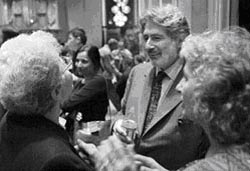Said attacks U.S. policy in Middle
East

Brian Stryker / The Daily
Edward Said talks with attendees of his lecture at its following reception.
Said spoke in Kane Hall last night on topics including the U.S.-led invasion
of Iraq and the Israeli military incursions into the West Bank and Gaza Strip.
by Brian Turner
05/09/2003
Before a capacity audience in Kane Hall last night, Edward Said, an outspoken
supporter for Palestinian nationalism and a renowned scholarly critic, accused
the United States of “imperialistic arrogance” and “inhumane”
policies in the Middle East.
An author of more than 15 books and formerly a supporter of the Palestine Liberation
Organization, Said’s life is as full of accomplishment as it is controversy.
He said the American media offers “prepackaged cliches.” He labeled
claims by President Bush “rubbish.” He likened the United States
to an oversized, overpriced sport-utility vehicle.
In response, Said received cheers and a standing ovation.
“Who assigned us, the U.S., the role of bringing democracy to Iraq?”
asked Said. “Every American needs to ask that question.”
Said was originally scheduled to speak on behalf of the Danz Lecture Series,
but after a request from the Danz family and fellow sponsors, the speech was
switched to the Walker-Ames Lecture Series. As prominent members of the Jewish
community, the Danz family said it did not want to be misrepresented by welcoming
Said in its name, according to Yvette Moy, lecture coordinator for the Danz
and Walker-Ames lectures.
Tickets to the free event were available to the public two weeks ago, but all
700 hundred of them were given away within three hours. Members of the Danz
family also attended the lecture.
“Mr. Said is highly respected in his writings, he is extraordinarily
well-known and the controversies surrounding his past do not lessen his standing
in the academic community,” said Gerald Baldasty, professor and chair
of the Department of Communication. Baldasty is also co-chair of the Danz and
Walker-Ames faculty selection committee.
In early biographical accounts, Said claimed he spent most of his life as a
Palestinian refugee, but a publication in Commentary magazine accused him of
fabricating his childhood. Said revealed in recent memoirs that he was born
in Cairo, Egypt, to the son of a wealthy Palestinian businessman.
“The fact that Mr. Said has lied about his background seriously discredits
his academic reputation,” said philosophy professor Marc Lange. “He
should not be invited to sow anti-Semitic views in the name of the highest academic
honor at the UW.”
Said’s critically acclaimed book, Orientalism, examines the way Islamic
and South Asian culture is perceived by Western society. Written in 1978, the
book has since shaped scholarly debate and revolutionized the study of the Middle
East. Said is also professor of comparative literature at Columbia University
and the past president of the Modern Language Association.
“It is unfortunate that when we speak out as a community, people look
for ways to discredit us,” said Atefah Naeemi, a member of the Muslim
Student Association. “(However,) people still want to see him even if
they do not sympathize with his views.”
Carrying Israeli flags and handing out fliers, a small group of demonstrators
gathered outside of Kane Hall to protest Said’s arrival.
“Said is just another person who wants to blame the Jews for conflict
in the Middle East,” said Eric Hasson, president of Huskies for Israel.
Hasson said he feels that Said is not qualified to speak on U.S. policy in
the Middle East because he is a professor of comparative literature. Citing
Said’s fabricated life story, his prior support of the Palestian Liberation
Organization and accounts of him throwing rocks at an Israeli military outpost,
Hasson said inviting Said reflects poorly on the UW.
“Said is here under the auspices of academic freedom, which gives him
too much credibility,” Hasson said.
Following his presentation, Said answered questions from the audience. One
of the members asked how peace can be obtained in the Middle East.
“To solve this conflict,” said Said, “the U.S. must join
the rest of the world’s resolutions for peace in the Arab world.”
Israeli supporters protest lecture
by Kyle Arnold
05/09/2003
As a crowd gathered in anticipation of last night’s Edward Said lecture
in Kane Hall, protesters gathered peacefully outside near the crowd to show
their support of Israel and dislike for Said’s opinions.
About 20 protesters held signs claiming that Said had to lie to gain support
for his pro-Palestinian cause.
“Said has fabricated his entire life story,” said Huskies for Israel
president Eric Hasson. “He isn’t a Palestinian refugee. He was born
while his parents were visiting Israel.”
Hasson said the purpose of the protests was to peacefully and respectfully
show their dislike for Said, not to gain attention through disrespectful behavior.
Members of Huskies for Israel were also present inside the Said lecture, according
to Hasson. He said that opposition inside was just as respectful as opposition
protesting outside.
“When we have had pro-Israeli speakers, protesters are so disrespectful
that they don’t let presentations continue,” said Hasson. “We
want to show that we are respectful of other views as well.”
A lecture last week by Ra’anan Gissin, senior adviser to Israeli Prime
Minister Ariel Sharon, ended early due to disruptions.
As an alternative to the Said speech, Huskies for Israel staged their own presentation
on being an Israeli in the United States.
Members of Alpha Epsilon Pi, the Jewish fraternity, joined Huskies for Israel
in their protests against Said.
Former UW doctorate candidate Larry May and his wife, Ruth May, a former registrar
for the UW-Bothell campus, also joined Huskies for Israel. They said they protested
against Said for other reasons.
Larry explained that while on a trip to Israel in November, there were three
suicide attacks against Israelis.
“I was in Israel and experienced what effects suicide bombers had on
the Israeli people,” he said. “I want to show my support for a peace
in Israel in a constructive manner.”
